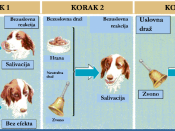Week Four: Classical conditioning essay
1 |
5 |
Week Four: Classical conditioning essay
Classical conditioning theory involves the decrease or increase of behavior thorough pairing and removal of stimuli. When It comes applying classical conditioning on a behavior- i.e. a criminal behavior, classical conditioning can increase and through the exposure of certain stimuli. Classical conditioning can heightened a criminal behavior because it involves either a reward or punishment right after the crime has been committed. Behavior such as stealing vehicles; the reward right after is alleviation of the individuals anxiety of being immobile. However, if the criminal was caught, the consequences of stealing which could result in jail time. Behaviors involving receiving reinforcement-like alleviating an anxiety or rewards such as money may increase the behavior instead of reducing it. When an individual commits robbery-the exhilaration or feeling of arousal.
This same feeling is generated after committing other crimes. The pairing of this feeling (secondary stimulus) with the act of stealing from someone (primary stimuli) is a typical behavior which results in classical conditioning. Additionally, if the individual has been caught-the punishment (beating, arresting or being embarrassed) will decrease this behavior because of the feeling (secondary stimulus).
Classical conditioning also known as aversion therapy is used to eliminate bad or harmful behaviors. This type of conditioning usually comes with either a reward or punishment that can help eliminate behaviors. This type of therapy usually pairs stimulus that stimulates pleasure from the behavior. Classical conditioning can be seen as a learning process that involves changing behavior brought by experiences. These changes in behavior are as a result of performance due to learned or unlearned actions. Classical conditioning usually links to behaviors at...


